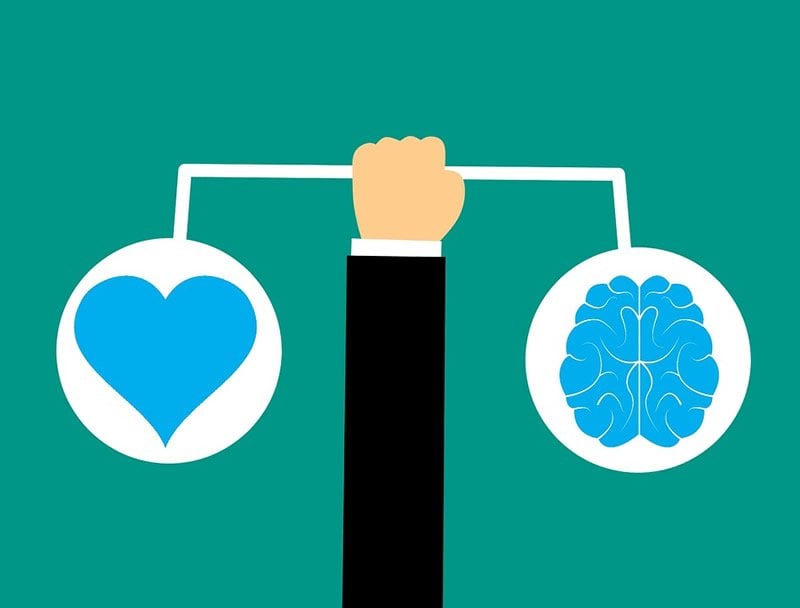Summary: Twin study reveals higher cardiovascular health is associated with better cognitive health.
Source: Emory Health Sciences
Emory University researchers are giving us double the reasons to pay attention to our cardiovascular health – showing in a recently published study in the Journal of Alzheimer’s Disease that good heart health can equal good brain health.
The American Heart Association defines ideal cardiovascular health (CVH) across seven modifiable risk factors (blood sugar, serum cholesterol, blood pressure, body mass index, physical activity, diet and cigarette smoking). Higher CVH scores point to better heart health and lower risk for cardiovascular disease (CVD).
Prior studies have indicated that ideal CVH also benefits brain health and cognitive aging. However, it was unclear how genes and/or environment played into the relationship between cardiovascular risk factors and cognitive decline.
By studying pairs of twin brothers from the Vietnam Era Twin (VET) registry, researchers were able to observe the relationship between CVH and cognitive performance across all participants that may be explained by genetics and/or exposures or behaviors that are shared by members of the same family.
Twin studies are a special type of epidemiological study that allow researchers to examine the overall role of genes and environment in a behavioral trait or disorder. Identical twins share 100 percent of their genetic material, while fraternal twins share on average 50 percent of genetic material. For a given trait or medical condition, any excess similarity between identical twins compared with fraternal twins, is likely suggestive of genes rather than environment. Twin studies can serve to differentiate between “nature vs. nurture.”
“Our study across the entire sample of twins confirmed that better CVH is associated with better cognitive health in several domains,” says senior author Viola Vaccarino, MD, PhD, Wilton Looney Professor of Cardiovascular Research, Rollins School of Public Health, and professor, division of cardiology, Emory University School of Medicine. “The analyses further suggested that familial factors shared by the twins explain a large part of the association and thus could be important for both cardiovascular and brain health.”

To determine whether these familial factors were genetically or environmentally driven, researchers further stratified the within-pair analysis to determine whether the relationship between CVH and cognitive function was different between identical and fraternal twins.
The within-pair association was similar in identical and fraternal twins. Therefore familial factors, such as early family environment, early socioeconomic status and education, and parenting – rather than genetics – may be important precursors of both cardiovascular and brain health – thus explaining some of the association between CVH and cognition.
“Improving population-level CVH scores, which are extremely low in the United States, has the potential to reduce the burden of dementia along with heart disease,” says study co-author Ambar Kulshreshtha, MD, PhD, assistant professor of family and preventive medicine, Emory University School of Medicine. “Because CVH factors are modifiable, prevention of cardiovascular risk factors and promotion of a healthy lifestyle beginning early in life should achieve the best results for promoting not only cardiovascular health, but also cognitive health.”
Source:
Emory Health Sciences
Media Contacts:
Megan Jentz – Emory Health Sciences
Image Source:
The image is in the public domain.
Original Research: Open access
“Association Between Cardiovascular Health and Cognitive Performance: A Twins Study”. Viola Vaccarino et al.
Journal of Alzheimer’s Disease doi:10.3233/JAD-190217.
Abstract
Association Between Cardiovascular Health and Cognitive Performance: A Twins Study
Background/Objective: The 2020 Strategic Impact Goal introduced by the American Heart Association (AHA) aims at improving cardiovascular health (CVH) of all Americans by 20%. AHA defined ideal CVH across seven established modifiable risk factors for cardiovascular diseases. Prior studies have indicated that ideal CVH also benefits brain health and cognitive aging, but it is possible that this association is explained by familial factors.
Methods: We examined 272 male monozygotic and dizygotic twin pairs (total 544 subjects) free of overt cardiovascular disease and dementia from the Vietnam Era Twin Registry. Memory and learning were measured by Trail Making tests and Wechsler Memory Scale (Immediate and Delayed Memory tests and Visual Reproductive Test). Each of the seven CVH components (smoking, body mass index, physical activity, diet, total cholesterol, blood pressure, and blood glucose) was scored per established criterion.
Results: The mean age of the twins was 55 years, 96% were whites, and 61% monozygotic. When considering twins as individuals, for every unit increase in CVH score (indicating better cardiovascular health), twins demonstrated faster cognitive processing speed (Trail B: – 5.6 s, 95% CI – 10.3, – 0.9; p = 0.03) and better story recall, both immediate (0.35, 95% CI 0.06, 0.62; p = 0.02) and delayed (0.39, 95% CI 0.08, 0.70; p = 0.01).
Conclusions: Better CVH is associated with better cognitive health in several domains. As suggested by within-pair analysis, this association is largely explained by familial factors, implying that early life exposures are shared determinants of both brain health and cardiovascular health.






